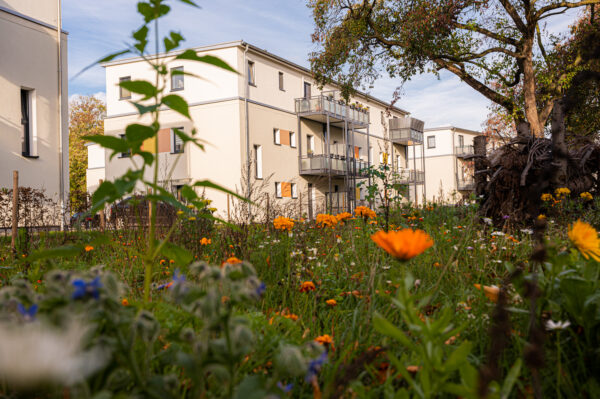Dialogue with Tenants and Participation
GRI
2-29
Participation processes are particularly important, and not just when it comes to comprehensive construction and modernization measures. There is a legally prescribed participation process for construction projects, which we consistently adhere to. We also use comprehensive voluntary participation formats, which allow tenants to have their say, and through which they can exert influence on the design of projects. For example, the focus can range from general questions regarding the design of the residential environment to specific topics such as the design and arrangement of parking lots.
Actively designed participation processes and citizen involvement procedures therefore begin at the planning phase – sometimes several years before the actual construction work begins. This enables us to find solutions for the neighborhoods together with the local communities. We rely on various formats such as tenant surveys, door-to-door or one-on-one meetings, tenant meetings and workshops, as well as informational events and neighborhood walks. The first point of contact for people in the neighborhood expressing their concerns will continue to be the caretakers and neighborhood managers as well as our leasing offices.
Participation measures are becoming increasingly important to strengthen acceptance for community development and the associated, often long-term, measures. Taking the partially heterogeneous interests of numerous stakeholders into account is also gaining constantly in significance. Our experience shows that participation procedures achieve the best results in the end.
Restrictions relating to the pandemic continued to have an impact on the type and scope of participation formats we were able to organize in the first half of the reporting year. Since 2020, we have increased the use of contactless ways to include our tenants. We often communicate with older and long-term tenants via telephone, for instance. Tenants have been able to post written replies in centrally located participation mail boxes. In-person appointments also took place, and in strict compliance with hygiene regulations. We have replaced large informational events with neighborhood tours in small groups and video conferences. But we still believe that participation only works when people participate, and this is where digital formats have been less successful (so far). With the removal of the last hygiene restrictions in February 2023, we decided to revive our in-person formats, bringing them back to pre-pandemic levels in the coming reporting year, in order to maintain direct communication with our tenants.
Open and transparent communication with municipal authorities also has an important role to play in the success of urban development projects. For information on our activities to help shape the political dialogue, see Contribution to Socio-Political Dialogue.
Consultation Projects in 2022 (Examples):
- Miquelallee neighborhood in Frankfurt am Main: Before the comprehensive maintenance and energy refurbishment construction work begins in spring 2023, the tenants were informed in advance of the planned changes and construction stages in their neighborhood using a comprehensive communication concept including tenant assemblies, regular local tenant contact hours and viewings of model homes. The participation measures will run for the duration of the entire project.
- Huckarde neighborhood in Dortmund: Vonovia invited all residents of the neighborhood on Insterburger Strasse to an open dialogue to answer the question “How do we want to live in the future?” in September 2022 in order to discuss the shaping of their residential environment. Ideas were collected using a tenant survey and over the course of three tenant workshops and later included as ideas for the initial concepts from several landscape architecture firms. On this basis, new design concepts for the outdoor areas and residential environment of the neighborhood will gradually be developed over the course of further neighborhood development measures.
- Waldau neighborhood, Kassel: In the Waldau neighborhood in Kassel, at the beginning of 2022, the local tenants were actively involved in the preparations for planned energy-efficient modernizations and climate-friendly redesigns in the residential environment. As part of this involvement, a written survey was conducted to obtain tenants’ opinions on aspects such as the current housing situation, the quality of neighborly relations, social infrastructure, the residential environment and green space, and climate- and mobility-related aspects. The core results of the survey included the residents’ desire for energy-efficient buildings and an ecologically and socially upgraded residential environment. As one of the first upgrading measures, the “Pumpenhäuschen” was redesigned in fall of the reporting year together with children and young people from the neighborhood.


